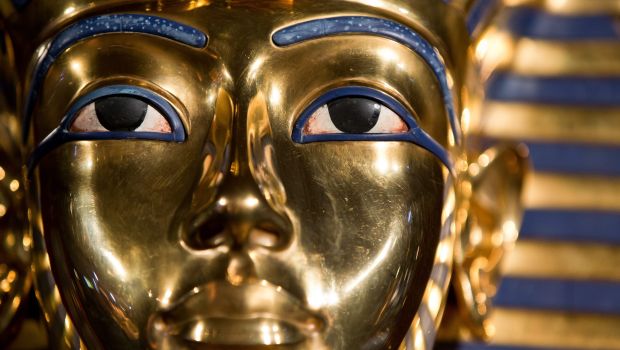
File photo—A replica of Tutankhamun’s burial mask is on display during a preview of the exhibition ‘Tutankhamun-His Tomb and His Treasures’ in Nuremberg, Germany on October 11, 2013. (EPA/DANIEL KARMANN)
Cairo, Asharq Al-Awsat—Writing for the Washington Post on Saturday, Egyptian minister of state for antiquities, Mohamed Ibrahim, highlighted the growing problem of antiquities theft that is currently plaguing the country during this period of political and security upheaval.
Ibrahim explained that “thieves are raiding our archaeological sites and selling their findings to the highest bidders.”
Following the January 25 revolution in 2011, many of Egypt’s museums and historical sites were subjected to theft and vandalism.
Similarly, in August 2013 the country’s Mallawi museum in the Minya Governorate in Upper Egypt was ransacked by supporters of ousted President Mohamed Mursi.
In late September, Ibrahim had announced that Cairo successfully tracked down a number of Egyptian antiquities for sale on famous online auctioning sites and that Egypt had subsequently undertaken the necessary legal procedures to prevent their sale.
An official source at the Ministry of State for Antiquities (MSA) revealed to Asharq Al-Awsat that “these networks have attempted to trade pieces, including a number of Pharaonic artifacts from different historical eras. In addition, there is also Egyptian currency dating back to the 1940s, to the reign of King Farouk. Their value is estimated to be over USD 650,000.”
Antiquities experts informed Asharq Al-Awsat that “the Mallawi museum held 1,089 historical artifacts, but only around 500 have been recovered. The rest are still missing.”
Experts believe that the missing pieces are among those being traded through online auctioning sites.
Mohammed Tawfiq, the Egyptian ambassador to Washington, sent a copy of a letter he had sent to the global auctioning site eBay to the minister of state for antiquities on October 4. The letter requested the termination of sales of Egyptian antiquities promoted through the site.
The ambassador informed Ibrahim of the foreign ministry’s efforts, through their embassy in Washington, to prevent the US-based auctioning site eBay from promoting any further sales.
Ibrahim confirmed that the Egyptian ambassador sent a statement to the CEO of eBay. Speaking on behalf of the Egyptian government, the ambassador demanded the halt of the sale of Egyptian artifacts listed on the site, until their origin and the authorization for exporting could be verified. He also affirmed that the Egyptian government would take all the necessary legal procedures to investigate the authenticity of the artifacts.
The statement sent to the Supreme Council for Antiquities explained the procedures taken by the Egyptian foreign ministry for verifying the authenticity of some 800 suspected pieces posted for sale on eBay.
The ministry conducts periodic checks of internet sites promoting the sale of Egyptian artifacts, in efforts to block the sale and secure the return of any artifacts smuggled out of the country illegally.
Ibrahim had previously informed Chinese news agency Xinhua: “At least 2,000 artifacts have been stolen since the eruption of 2011 unrest in Egypt due to the political turmoil and consequent violence.”
In May, the Egyptian Embassy in London notified Interpol that some 200 pieces were on sale in London’s privately owned Bonhams Auction House, requesting that the auction house put the sale on hold pending further investigation.
Egypt is working strongly with UNESCO and Interpol to recover lost items. Protected pieces have been placed on a Red list to be protected from sale in auction houses and galleries under the 1970 Convention against Illicit Traffic of Cultural Heritage.
In September 2013, the Ministry halted the sale of some 126 items for sale at two auction houses in Jerusalem.
However, Ibrahim revealed in Saturday’s article that many more “auction houses have been unwilling to cooperate with requests to delay or cancel sales of items that experts assess have been stolen.”
The task of tracking down the antiquities will seemingly be a long and complicated one.
